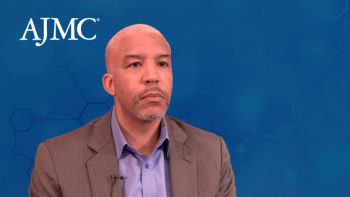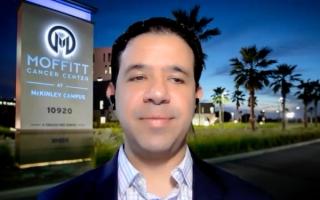
Comprehensive Genomic Profiling
Latest News

Latest Videos

More News

A real-world analysis found that comprehensive genomic profiling (CGP) in patients with non–small cell lung cancer (NSCLC) increases their therapy options patients and CGP testing needs to be utilized more.

Recommendations discuss appropriate use and diagnostic, prognostic, and therapeutic implications of cardiac genetic testing, including guidance on impact of exercise.

Posters from the American Association of Cancer Research (AACR) Annual Meeting demonstrated the use of genomic profiling and sequencing can detect immunotherapy biomarkers and predict clinical outcomes in patients with cancer.

Prescribing is a complex process with multiple factors to consider on top of the 3 primary questions about effectiveness, harm, and cost. Pharmacogenetics has put this complexity under the spotlight and prompted educational programs and the development of new clinical decision support systems.

There are an increasing number of targeted therapies in oncology, but challenges around biomarker testing and treatment selection remain.

Today, health plans are shifting dollars to more value-based contracts along with investments in population health management. Digitizing lab results across all care settings and unlocking the potential of lab values can help health plans reach the Triple Aim of improving the patient experience, improving the health of populations, and reducing the per-member cost of health care.

David Skomo, and Nick Page, PharmD, of WellDyne offered their perspectives on recent developments in precision medicine at the 2022 Asembia Specialty Pharmacy Summit.

Next-generation sequencing identified different molecular profiles of pediatric and adult sarcomas among Chinese patients.

The trends in the hemophilia treatment market are gaining momentum with increasing incidences of hemophilia A and B and staggering need for their treatments, including gene, anti-tissue factor pathway inhibitor, and factor replacement therapies.

Michael Ciarametaro, MBA, vice president of research at the National Pharmaceutical Council, highlights steps clinics can take to mitigate issues related to data collection regarding cell and gene therapies.

Key opinion leaders addressed cost, accessibility, and other barriers limiting use of comprehensive genomic profiling (CGP), and how employers can help drive preventive care and precision medicine through CGP.

Despite technological advancements, there are still many factors that can cause specimens for comprehensive genomic profiling (CGP) testing to become compromised, potentially leading to inaccurate prognostic results, according to a recent webinar.

The clinical utility of genomic profiling was demonstrated in patients with advanced gastrointestinal (GI) cancers whose access to targeted therapies based on tissue-based assay findings was similar to those with non-GI cancers.

The acceleration of science and medicine is exciting, but these new advances are not always moving into practice, said Jorge Plutzky, MD, director of the Vascular Disease Prevention Program and director of Preventive Cardiology at Brigham and Women’s Hospital, and associate professor of medicine at Harvard Medical School.

Everything from the genomic data for the cancer to the zip code of a patient matters when delivery care, said Edmondo Robinson, MD, MBA, MS, FACP, senior vice president and chief digital officer at Moffitt Cancer Center.

Posters from the American Society of Clinical Oncology Genitourinary Cancers Symposium (ASCO GU) 2022 look at how the tumor genomic landscape differs based on age and type of urothelial carcinoma.

The special enrollment period for Affordable Care Act (ACA) coverage has opened to low-income Americans; the FDA approves the first drug for a rare genetic epilepsy disorder; the National Institutes of Health to launch biomarker testing program for pediatric tumors.

A provisional clinical opinion from the American Society of Clinical Oncology (ASCO) recommends that patients with advanced cancer with specific genomic alterations undergo genomic sequencing.

FoundationOne CDx has been approved as a companion diagnostic to identify patients with non–small cell lung cancer (NSCLC) with epidermal growth factor receptor (EGFR) exon 19 deletions or exon 21 alternations eligible for treatment with EGFR tyrosine kinase inhibitors.

Genome sequencing of tumors from children and adolescents with recurrent or refractory cancer led to over 100 patients receiving targeted therapies.

Ron Do, PhD, associate professor, Charles Bronfman Institute for Personalized Medicine at Mount Sinai, and Iain Forrest, MD-PhD candidate in Dr Do’s lab, discuss their hopes for their findings and how genetic data are being used in health care.

Ron Do, PhD, associate professor, Charles Bronfman Institute for Personalized Medicine at Mount Sinai, and Iain Forrest, MD-PhD candidate in Dr Do’s lab, explain their study's implications for providers and how age plays a role in genetic variant penetrance.

Ron Do, PhD, associate professor, Charles Bronfman Institute for Personalized Medicine at the Icahn School of Medicine at Mount Sinai, and Iain Forrest, MD-PhD candidate in Dr Do’s lab, explain the differences between the biobanks used in their study on population-based penetrance of clinical variants.

Thermo Fisher Scientific will begin accepting submissions for grant proposals focusing on molecular profiling in cancer spaces, where applicants could receive up to $200,000 in funding.

Ron Do, PhD, associate professor, Charles Bronfman Institute for Personalized Medicine at the Icahn School of Medicine at Mount Sinai, and Iain Forrest, MD-PhD candidate in Dr Do’s lab, discuss the results of their recent study measuring population-based penetrance of pathogenic and loss-of-function clinical variants.














